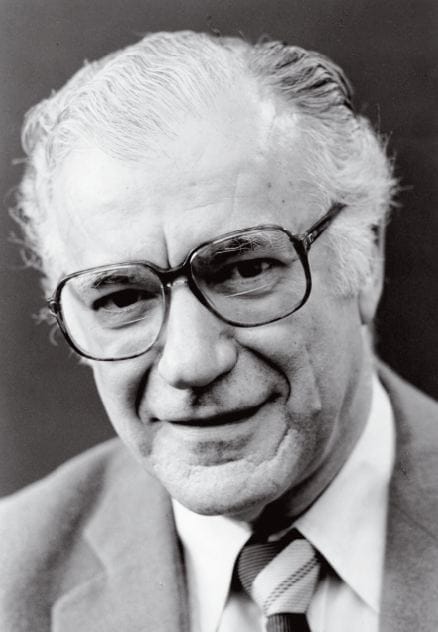At the end of 2011, Wharton lost three influential faculty members: Morris Hamburg, C’43, GR’52, professor emeritus of statistics and operations research; Robert J. House, professor emeritus of management; and Howard V. Perlmutter, professor emeritus of social architecture and management.
Committed Teacher With Wide Impact
 A renowned and often-honored teacher and mentor, Hamburg impacted generations of students, including Paul E. Green, professor emeritus of marketing, whom he advised during his early development of conjoint analysis, a statistical method for determining how consumer value different features of one product or service.
A renowned and often-honored teacher and mentor, Hamburg impacted generations of students, including Paul E. Green, professor emeritus of marketing, whom he advised during his early development of conjoint analysis, a statistical method for determining how consumer value different features of one product or service.
Hamburg earned his undergraduate degree from Penn and began teaching at Wharton in 1946 while earning his Ph.D. under Economics Nobel Laureate Professor Simon Kuznets. Hamburg’s principal fields of research were managerial decision analysis, forecasting and planning, economics, securities markets, and industrial basic and applied research.
He directed studies on urban economic planning and managerial information systems for universities and large public libraries. In the 1980s, he was chairman of an advisory committee to the U.S. Department of Energy, for which he was commended for his service.
Colleague Abba M. Krieger, Wharton’s Robert Steinberg Professor, remembers Hamburg as an extremely wise person often used by the university to negotiate and work through difficult situations.
“He would have been a wonderful dean,” Krieger says, “but as Morris often quipped, ‘The best title in a university is professor.’”
Morris Hamburg died on November 14 at the age of 89.
On Global Organizational Behavior and Leadership
 House was a dedicated scholar who was committed to D.O. Hebb’s maxim that “a good theory is one that holds together long enough to get you to a better theory.” House held several faculty appointments prior to joining Wharton in 1988 as the Joseph Frank Bernstein Professor Endowed Chair of Organization Studies.
House was a dedicated scholar who was committed to D.O. Hebb’s maxim that “a good theory is one that holds together long enough to get you to a better theory.” House held several faculty appointments prior to joining Wharton in 1988 as the Joseph Frank Bernstein Professor Endowed Chair of Organization Studies.
House’s research into the role of personality traits and motives related to effective leadership and organizational performance led him to develop his theory of “charismatic leadership.” He was the principal investigator and founder of the Global Leadership and Organizational Behavior Effectiveness (GLOBE) Research Program beginning in 1993, which examined 62 societies for 10 years for the impact of cultural and societal difference on organizational behavior and leadership. Colleague Steve Kobrin, the William H. Wurster Professor of Multinational Management, noted, “It was a very ambitious undertaking that has made a major contribution to the field.”
Robert J. House died November 1 at the age of 79.
Visionary of Globalization
 Nearly 40 years ago, soon after starting teaching at Wharton in 1969, Perlmutter predicted the development path of multinational institutions in a paper that is considered the foundation for globalization scholarship.
Nearly 40 years ago, soon after starting teaching at Wharton in 1969, Perlmutter predicted the development path of multinational institutions in a paper that is considered the foundation for globalization scholarship.
According to colleague Mauro F. Guillén, the Dr. Felix Zandman Professor of International Management, Perlmutter’s most important contribution was the concept of “mindset” in the context of the multinational firm.
“Howard so simply and elegantly captured the mindsets of multinationals that his work will remain one of the most fundamental readings in IM,” Guillén says.
Perlmutter was also known as an approachable person whose legendary ability for connecting with listeners earned him the nickname “the Pearl.” He was the founder and director of the Worldwide Institutions Research Center and chairman of the Multinational Enterprise Unit. He served as an adviser to the Canadian and U.S. governments; the World Health Organization; and numerous firms, universities and municipalities.
“He had an amazing mind and an ability to focus on big issues,” Kobrin says. “He really wanted to make the world a better place.”
Howard V. Perlmutter died November 8 at the age of 86.


























